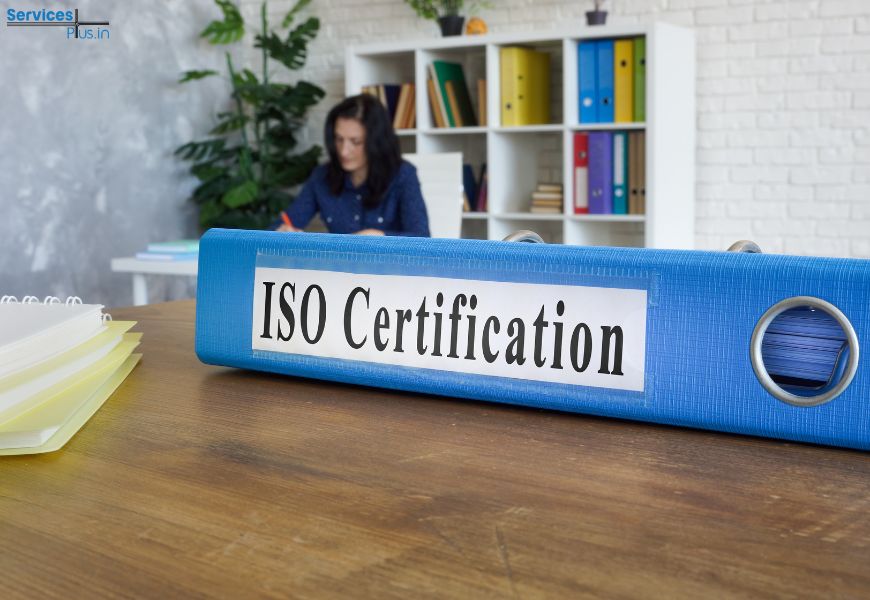ISO certification plays a significant role in the institutional design of quality and efficiency not only in India but across the globe. Gaining ISO license registration in India context in their way does wonders to your business credibility and operational efficacy and prospects for going global. Services Plus will serve as a complete guide for the whole ISO certification registration online procedure in India, and you will learn how to successfully apply online for ISO certification in India.
What is ISO Certification?
Getting ISO license registration in India is a disclaimer among your organization's best practices and adherence to global standards.
Types of ISO Certifications Available in India
- ISO 9001:2015
Quality Management System certification applicable to all industries.
- ISO 14001:2015
Environmental Management System standard
- ISO 27001:2013
Information Security Management System certification
- ISO 45001:2018
Occupational Health and Safety Management System
- ISO 22000:2018
Food Safety Management System certification
- ISO 13485:2016
Quality Management System for Medical Devices
Key Advantages of ISO Certification for Indian Businesses
- Enhanced credibility: Customers and stakeholders have confidence in the quality of an ISO-certified product.
- Competitive advantage: Marks your business among competitors and in very competitive markets through ISO license registration in India.
- Improved efficiency: Streamlining the processes consumes lesser resources and reduces waste.
- Global quality: Naturally opens windows for international business.
- Regulatory compliance: Helps earn things of statutory and regulatory requirement.
- Increased profitability: Savings from improved processes due to less waste.
Ready to Go for ISO Certification Process?
Experts are there to help you to apply online iso certification in India process of registration for ISO certification and successful certification.
Stepwise Process of ISO Certification in India
For obtaining an ISO certification registration process in India comprises the basic steps which an organization usually needs to complete to get certified. Let's see the steps in a detailed manner.
- Choose the Right ISO Standard
Choose between which ISO standard is most relevant to your business needs and objectives. Some commonly chosen standards, especially for Indian businesses, include ISO 9001 for quality management and ISO 27001 for information security, to name a few this is the basic process of ISO certification.
- Gap Analysis Assessment
An investigation is done on the existing processes versus the requirements of the selected standard's ISO.
- Documentation Preparation
Prepare all necessary documentation for ISO certification registration process in India, including quality manual, procedures, work instructions, records, and policies as required by the standard.
- Implementation
For the process of ISO certification, document the processes in your organization and ensure that all employees are aware of, and follow, the new processes.
- Internal Audit
The performance of an internal audit assesses the effectiveness of the applied system to determine failure points before the certification audit.
- Management Review
The performance of the system, audit results, processes, and opportunities for improvement is assessed by top management.
- Certification Audit
Recognition of certification bodies carries out two staged audits to determine compliance with the standard and suggests ISO certification registration process in India.
- Receive Certification
Once the audit is successfully passed and any non-conformities resolved, the organization receives its ISO certificate.
Requirements for ISO License Registration in India
Basic Requirements for Online Application of ISO Certification in India All legal business registrations (incorporation certificate, GST registration, etc.).
- Lists of directors/partners/proprietors of the business.
- PAN Card of the business Address proof of business premises.
- Details of products/services.
- Details: Number of employees Process flowcharts and organization charts Quality policy and objectives.
ISO Certification Fees in India
The costs of acquiring an ISO license in India vary from one client to the next on the following criteria:
ISO standard to which application
- The size and complexity of the organization
- The number of employees
- The number of processes/locations
- The certification body you have selected
Consultancy fees (if you're using a consultant)
The costs of certification typically range between 25,000 rupees to more than 200,000 rupees, or sometimes more for small to middle-sized enterprises.
How will you select the right ISO certification body in India?
While applying for ISO certification registration online, selecting the right certification body is of the utmost importance. Here are some considerations:
- Accreditation according to international bodies like IAF, UKAS, or local accreditors such as NABCB
- Reputation and experience in an industry
- Auditor Qualifications and experience in the field.
- Pricing structures
- Kind of services and quality of customer support even if they want to apply online ISO certification in India.
FAQs on ISO License Registration in India
- What is the validity of ISO certification in India?
Most certifications issued by the ISO organization would remain valid for 3 years with annual surveillance audits.
- How long does it take to register for ISO certification registration online?
Generally, the certification is completed in 5 to 7 days depending on the business type and clearance during the audit.
- Is ISO certification made mandatory for all businesses?
Not mandatory, but very much recommended for credibility and compliance purposes, especially for government tenders and/or exports.
- Is it possible to obtain ISO certification without a physical office?
Yes, you can now apply online for ISO certification in India even if you operate your company from home, as long as you have proper documentation.
- Which ISO certification is preferred for startups?
ISO 9001 (Quality Management) is mostly accredited by startup organizations for process improvement and gaining trust from the customer base.


 Proprietorship Registration
Proprietorship Registration





